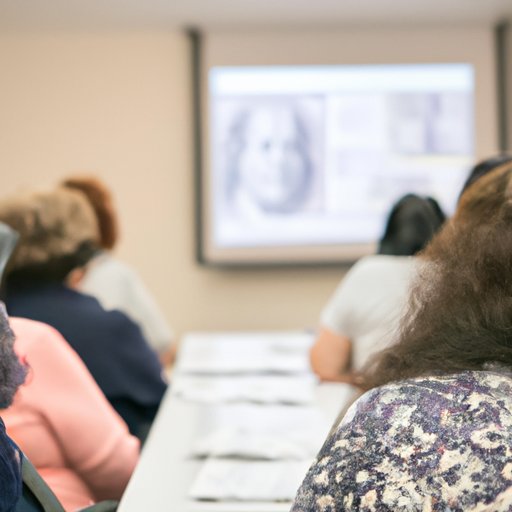Introduction
Financial literacy is the ability to understand and use financial knowledge to make informed decisions about money. It involves understanding a variety of topics such as budgeting, investing, credit, debt, insurance, retirement planning, and taxation. Becoming financially literate can help you to manage your money better and make smarter financial decisions.

Taking an Online Course in Financial Literacy
One way to become financially literate is to take an online course. There are many courses available on a variety of topics related to financial literacy that can help you gain the knowledge and skills you need. When selecting a course, look for one that covers all the topics you’re interested in and is tailored to your level of experience. Additionally, be sure to select a course from a reputable source.
The advantages of taking an online course include the convenience of studying from home or wherever you have access to a computer or laptop. You can also work at your own pace and review material as needed. Furthermore, you can often find courses that are free or low-cost.
Reading Books and Blogs About Personal Finance
Books and blogs are another great way to become financially literate. Look for books written by experts in the field who have a track record of success. Some popular titles include “The Richest Man in Babylon” by George S. Clason, “Rich Dad Poor Dad” by Robert Kiyosaki, and “The Total Money Makeover” by Dave Ramsey. You can also find plenty of helpful blogs that cover topics related to personal finance.
The benefits of reading books and blogs about personal finance include gaining new insights into how to manage your money, staying up to date on trends and developments in the world of finance, and being able to ask questions and get answers from experienced professionals.
Following Financial Experts on Social Media
Social media is another great way to learn about personal finance. There are many financial experts who post regularly on platforms like Twitter, LinkedIn, and Instagram. Take some time to identify the experts who have the most relevant experience and knowledge for your own situation. Then, follow them and start engaging with their posts.
By following financial experts on social media, you can stay up to date on the latest financial news and advice, ask questions and get answers, and even participate in virtual events and webinars. This will help you build your financial knowledge and network with other like-minded individuals.

Making a Budget and Tracking Your Spending
Creating a budget and tracking your spending are essential components of becoming financially literate. Start by listing all of your income sources and expenses. Then, set aside a portion of your income for savings and establish limits for each expense category. Finally, track your spending to ensure that you’re staying within your budget.
Making and tracking a budget will help you stay on top of your finances, identify areas where you can save money, and ensure that you’re making progress toward your financial goals.
Creating Short-Term and Long-Term Financial Goals
Creating short-term and long-term financial goals is a key step in becoming financially literate. Start by identifying your goals, such as saving for a down payment on a house or building an emergency fund. Then, create a plan for achieving those goals by setting specific targets and deadlines. Finally, track your progress to ensure that you’re making progress.
Developing financial goals and creating a plan for achieving them will help you stay focused and motivated to reach your financial objectives.
Researching Investment Options and Creating a Portfolio
Once you’ve developed a basic understanding of financial literacy, you can begin researching different investment options and creating a portfolio. Start by exploring different types of investments, such as stocks, bonds, mutual funds, and exchange-traded funds (ETFs). Next, create a diversified portfolio that matches your risk tolerance and goals. Lastly, monitor your investments regularly and adjust your portfolio as needed.
Researching investment options and creating a portfolio will give you the skills you need to grow and protect your wealth over the long term.

Attending Seminars and Workshops Related to Money Management
Finally, attending seminars and workshops related to money management can help you become financially literate. Look for local seminars and workshops that cover topics such as budgeting, investing, retirement planning, and debt management. These events can provide you with valuable insights and the opportunity to network with other like-minded individuals.
Seminars and workshops can be a great way to gain knowledge, ask questions, and get feedback from experienced professionals.
Conclusion
Becoming financially literate requires effort and dedication, but it can be a rewarding process. By taking an online course, reading books and blogs, following financial experts on social media, making a budget and tracking your spending, setting financial goals, researching investment options, and attending seminars and workshops, you can gain the knowledge and skills you need to master your money.
(Note: Is this article not meeting your expectations? Do you have knowledge or insights to share? Unlock new opportunities and expand your reach by joining our authors team. Click Registration to join us and share your expertise with our readers.)
